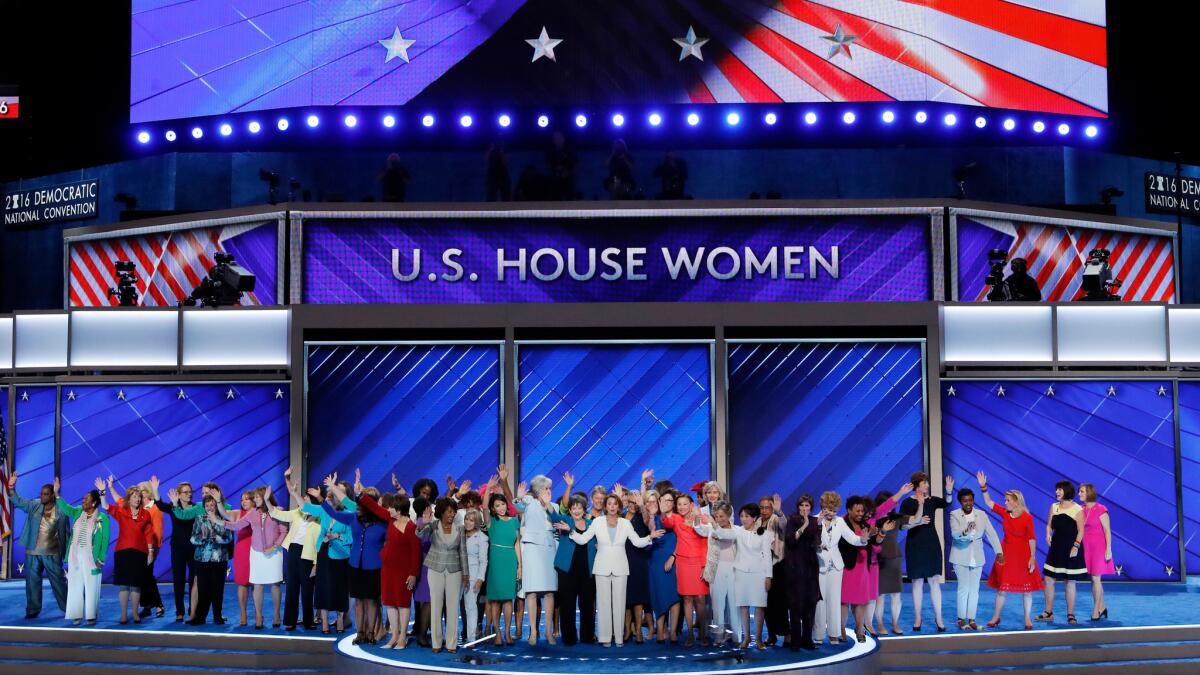Editorial: In the overwhelmingly male world of American politics, Hillary Clinton’s milestone matters

- Share via
It was no surprise that Hillary Clinton was nominated this week as the Democratic Party’s candidate for president of the United States. Nevertheless, when she takes the stage in Philadelphia Thursday night and becomes the first woman in American history to accept the top slot on the Democratic ticket, it will be a powerful, meaningful and satisfying moment for many. Finally, it seems, the promise that has been made to generations of girls — that they too could grow up to be president — may become more than a meaningless platitude.
This has been a long, long time in coming. Other nations, beginning in the 1960s, have had female leaders — India’s Indira Gandhi, Israel’s Golda Meir and later Britain’s Margaret Thatcher, Chile’s Michelle Bachelet and Germany’s Angela Merkel, to name a few. Currently, there are at least 18 nations led by women. But the closest a woman in the United States has come has been as the vice presidential candidate on a losing ticket.
Now, there’s a woman in the final stretch of the biggest race. A supremely qualified, well-prepared woman with decades of public service experience. And though she still may not achieve her ultimate goal in November, she’s already made history. As she herself put it on Tuesday: “We just put the biggest crack in that glass ceiling yet.” (Remember, it was only 21 years ago that a Wal-Mart store in Florida pulled a T-shirt from its shelves emblazoned with the message: “Someday a woman will be PRESIDENT.” Wal-Mart officials said the shirt was “offensive” to some shoppers and went against the chain’s “family values.”)
The reality is that political leadership in this country is still overwhelmingly a man’s world. Women are underrepresented from the lowest levels of government up to the White House. According to the Center for American Women and Politics at Rutgers, only 19% of the members of the U.S. House of Representatives and 20% of senators are women. The numbers are more dismal for women of color.
That is true in California as well. For all the state’s progressive leanings and even though it has two female senators, no woman has ever served as governor. Only about a quarter of California’s legislators are women, and the Los Angeles City Council has only one female representative out of 15. (The L.A. County Board of Supervisors, however, may well be dominated by women after the November election.)
It’s no secret that female candidates often have been required to withstand intense scrutiny and questions about their legitimacy even if, as in the case of Clinton, they are manifestly qualified for the job. And it is important to remember that even if a woman is elected president this year, that won’t mean that discrimination against women has become a thing of the past — any more than the election of President Obama meant an end to racial injustice.
So let’s take a moment to celebrate this moment, even if it isn’t the big prize in November. It matters, because every step forward makes it likelier that the next woman will reach the finish line.
Follow the Opinion section on Twitter @latimesopinion and Facebook
More to Read
A cure for the common opinion
Get thought-provoking perspectives with our weekly newsletter.
You may occasionally receive promotional content from the Los Angeles Times.










